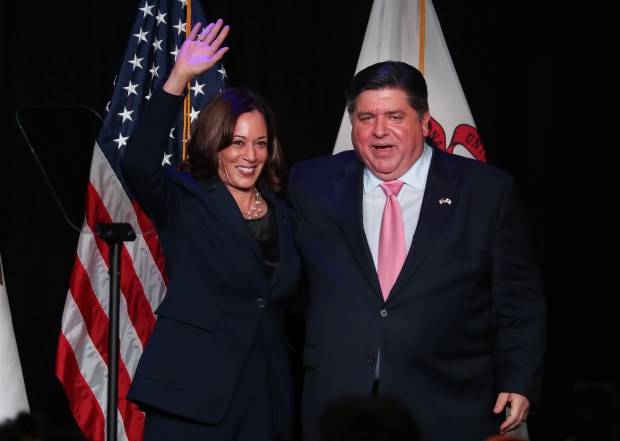JB Pritzker has been working toward this moment for much of his adult life.
But when the affable Illinois governor takes the stage Tuesday night at the Democratic National Convention, it will be under vastly different circumstances than he must have imagined when he led Chicago’s effort to bring the party’s quadrennial gathering to his hometown.
After a raucous political summer, Democrats have arrived in Chicago not to coronate President Joe Biden for a second term but to rally behind their newly crowned standard-bearer, Vice President Kamala Harris.
“This was a sea change,” Pritzker said in an interview late last week. “Nobody expected this to happen.”
The head-spinning turn of events since Biden’s unnerving debate performance in late June has muddied Pritzker’s political future, turning a prime-time convention speech that could have been the soft launch of a 2028 presidential bid into something less clear.
Even as he ponders what’s next, Pritzker, not even halfway through his second term, is relishing the role of dutiful host, booking John Legend to play an after-party at the Salt Shed following the governor’s speech and ordering up specially branded JBeer from a pair of local breweries to serve to guests.
During the summer’s tumult, Pritzker, a Biden campaign co-chair, displayed the patience and party loyalty that have been hallmarks of his political career.
While some Democrats wrung their hands and others, including several fellow Illinois officials, called for Biden to step aside, Pritzker refused to join the public chorus.
When the decision came and Biden picked Harris to take his place, Pritzker, perhaps the only prominent Democrat with the means to mount a credible challenge on such short notice, paused. But he fell in line less than 24 hours later and backed Harris, bringing the rest of Illinois’ Democratic establishment along with him.
“A lot of us who contemplated what’s best for the party understood that we need to go right to the top, to the vice president, and make sure that we’re all rallying around her,” Pritzker said, “partly because she’s the best person for the job right now and partly because it was the most expedient, fast thing we could do.”
In just a few weeks, Harris has “turned out to be a spectacular candidate,” Pritzker said, “I think exceeding all expectations.”
Amid the pressure campaign against Biden, Pritzker remained focused on promoting the party’s priorities and repudiating former President Donald Trump — attributes that brought the billionaire governor into the national conversation as a possible successor and earned him a place on Harris’ short list of potential running mates.
In a speech to Ohio Democrats last month, Pritzker, 59, displayed the self-deprecating, dorky-dad humor that has become familiar to Illinoisans while also encouraging the crowd to embrace both the chaos of the moment and the party’s progressive ideals.
“If we as a party can shake off the anxiety that waters down our policies and dampens our fervor, if we stop worrying about whether they might call us ‘woke’ and instead worry about whether we’re actually waking people up, if we stopped being so damned afraid of a little chaos and just embraced it as the path from here to there, we will win,” Pritzker said in the roughly 30-minute speech, a possible preview of what he’ll tell the United Center audience Tuesday.
From a family of Democrats
A scion of one of America’s richest families, Jay Robert Pritzker — JB for short — was born to Donald and Sue Pritzker in California, where Donald had moved the family to help run a fledgling hotel business.
Working with older brother Jay, Donald Pritzker grew Hyatt Hotels from a single Los Angeles location into an international chain.
While Hyatt is the best-known of the Pritzkers’ business ventures, the family fortune was built over generations after the governor’s great-grandfather, Nicholas J. Pritzker, came to Chicago in 1881 from Kyiv, his family fleeing the anti-Jewish Russian pogroms in present-day Ukraine. The governor’s other uncle and namesake, Robert, ran Marmon Group, the family holding company.
Pritzker’s parents were active in California politics, his father having served as finance chair of Edmund Muskie’s failed bid for the 1972 presidential nomination and his mother working as a state party official and an activist for abortion rights and other causes.
Despite his privileged upbringing, Pritzker’s early life was marked by tragedy.
His father died of a heart attack at age 39, when Pritzker was just 7. His mother, who struggled with alcoholism, died a decade later, when she leaped out of a tow truck that was pulling her car and was run over.
Those who know JB Pritzker well credit his empathy and down-to-earth demeanor that belies his vast wealth — which Forbes has pegged at $3.5 billion — at least in part to the challenging circumstances of his youth.
“It can kind of do one of two things to you,” said Christian Mitchell, a former Democratic state representative from Chicago who was one of Pritzker’s deputy governors during his first term. “It can either harden your heart and tell you that the world is a cold, dark place and you’ve got to kind of lower your head and just get through it by any means necessary, or it can open your heart and make you understand how precious life is, how vulnerable we all are to just the vicissitudes of the universe and can make you the kind of person who says, ‘If I’ve got a chance to help, if I’ve got a chance to give back, if I’ve been lucky enough to make it this far, not just financially but even just personally to live this long, that I ought to be giving back.
“And I think that that’s what you see in JB.”
‘JB Pritzker is not going anywhere’
That desire to give back is coupled with an ambition to do big things. And while Pritzker has deflected questions about his presidential aspirations, he’s done little to quell the chatter.
It’s only grown louder in the past year after Pritzker founded a dark money group, Think Big America, that uses his financial resources and political operation to bolster pro-abortion rights, causes and candidates in states from Virginia to Arizona.
Chicago landed the DNC in part because Illinois is a cornerstone of the Democratic Party’s Midwestern “blue wall,” which Pritzker has helped enforce through his progressive victories in Springfield and the state’s labor-friendly policies. But none of that was enough to land the governor a spot alongside Harris atop the ticket after he was vetted and interviewed twice by the vice president’s team.
After he was passed over for the No. 2 spot in favor of Minnesota Gov. Tim Walz, he told reporters, “I think you don’t get on that list unless they think you actually could be president of the United States and do the job if you had to.”
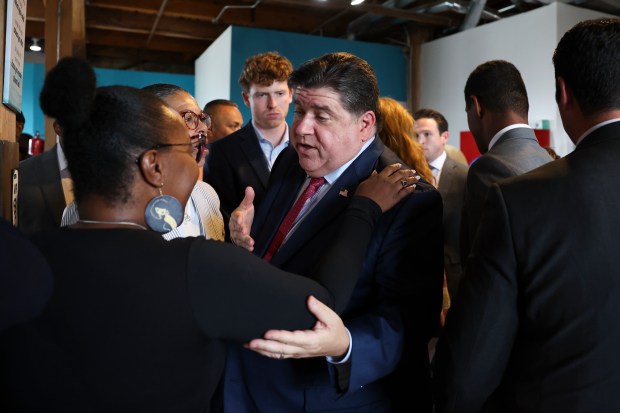
Despite the perceived setback, Pritzker is likely to remain in the national political conversation for years to come, said David Axelrod, a Democratic strategist and former top adviser to President Barack Obama.
“JB Pritzker is not going anywhere,” Axelrod said. “JB Pritzker is a significant figure in the Democratic Party and the country.”
That’s at least in part because, unlike Trump and some other wealthy businesspeople-turned-candidates, Pritzker didn’t come to politics later in life.
In the 1980s, he went to work on Capitol Hill for U.S. Sen. Terry Sanford of North Carolina and Sen. Alan Dixon of Illinois.
As a young Northwestern Law School student in the early 1990s, Pritzker founded Democratic Leadership for the 21st Century, a group that sought to bring more young voices into the party and helped spur the careers of several prominent Illinois officials and Democratic operatives.
Jesse Ruiz, who also was in law school at the time and later worked as one of Pritzker’s deputy governors, recalls being impressed by “this young guy, same age as I am” who’d founded the organization.
Not knowing anything about Pritzker’s background, Ruiz found him to be “just a friendly, unassuming guy … who was already doing some big things.”
“He wasn’t doing it to seek (the) spotlight,” Ruiz said. “He was doing it because he truly believed in what we were doing.”
Lessons learned from rough first race
Pritzker’s first bid for public office, however, was a flop.
Showing a willingness to wait his turn, Pritzker during the 1996 election cycle was poised to jump into the race to replace longtime U.S. Rep. Sidney Yates, who’d been in Congress since before Pritzker was born. But when Yates opted to seek a 24th term, Pritzker stood down.
When Yates did retire two years later, Pritzker jumped in, campaigning on his Capitol Hill experience and policy proposals that included banning handguns.
But he finished third in the Democratic primary behind two experienced state legislators, Sen. Howard Carroll and Rep. Jan Schakowsky, who won the primary and the general election and has held the seat since.
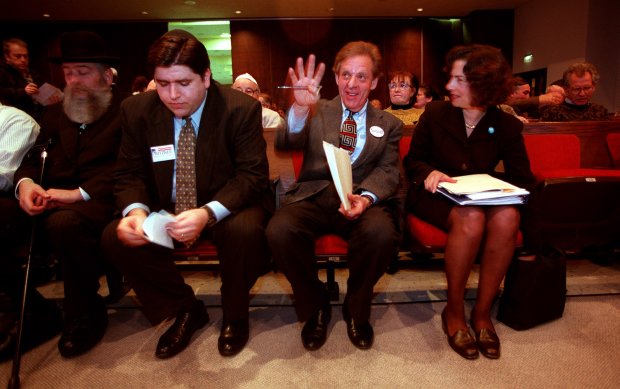
Out of concern over Pritzker’s wealth, Schakowsky pushed unsuccessfully for the candidates to agree to spending limits, though, in the end, the race showed having the biggest bank account didn’t guarantee victory.
“It was interesting because from a Washington perspective, people … thought JB had a really good chance because of the money,” Schakowsky said in a recent interview. “And locally they thought that Howie … would be the winner because he was a (Democratic) committeeman.”
Losing to Schakowsky seems to have turned out for the best for Pritzker, who “went on to have just this fantastic, fantastic career as the governor of our state,” she said, calling him “one of the most effective politicians that we have in this country.”
It took 20 years for Pritzker to put his name on the ballot again, but in the interim, he remained active in politics.
He was an ardent supporter of Hillary Clinton’s two presidential campaigns, including her 2008 Democratic primary bid against Illinois favorite son Obama.
The campaign divided the Pritzker family, with the future governor’s older sister, Penny Pritzker, serving as fundraising chair for the Obama campaign. She went on to serve as Obama’s third commerce secretary.
Behind the scenes during those years, Pritzker also expressed interest in holding public office himself.
The Tribune reported during Pritzker’s first campaign for governor that he was recorded in 2008 by federal law enforcement authorities on wiretapped phone conversations with Gov. Rod Blagojevich, who was then weighing an appointment to fill Obama’s U.S. Senate seat after the presidential election. On the call, Pritzker, who along with his wife, MK, contributed more than $140,000 to Blagojevich’s campaigns for governor and Congress, expressed interest in being appointed state treasurer if the position came open, which didn’t come to pass.
Outside the political arena, he built the Pritzker Group investment firm with his brother, Anthony, and helped seed Chicago’s burgeoning tech sector through incubator 1871 and other projects. He also was a driving force behind the creation of the Illinois Holocaust Museum in Skokie, among other philanthropic endeavors.
‘Her loss jolted me’
As Pritzker was supporting Clinton’s second White House bid in spring 2016, Michael Sacks, an investment firm CEO and active Democratic Party donor who led this year’s DNC host committee, approached him about running for governor.
At the time, the Democratic-controlled state legislature was locked in a bruising two-year budget stalemate with Republican Gov. Bruce Rauner, a wealthy venture capitalist who pushed a pro-business, anti-union agenda.
In Pritzker, Sacks saw “someone who had real credibility as a businessperson, who could push back on the false narratives that were running down the state,” he said, an “authentic” and “kind” person “completely committed to the social values important to Democrats” who would be “an obvious choice for governor if he was willing to put himself into the race.”
Initially, Pritzker declined.
“Whether I was governor or not, I was always going to be a stalwart for Democrats, to make sure that we’re lifting up everyday working people and so on,” Pritzker said.
But his thinking changed when Clinton lost to Trump that November.
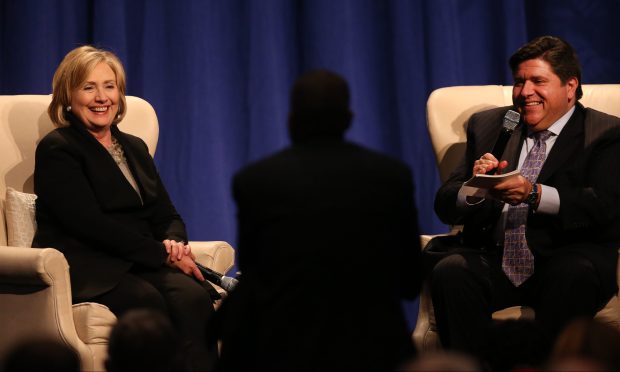
“Her loss jolted me in a way that I have never felt before or since,” Pritzker told the Ohio Democrats last month. “I was overcome with a sensation that I’m sure many of you probably felt: ‘My God, this can’t be real.’”
Although “the Democratic Party was not exactly crying out for a white, Ukrainian American, Jewish billionaire” to run for office, Pritzker said, “after Election Day in 2016, sitting still and doing nothing felt like mowing your lawn while your house burns down.”
It took a few more months for Pritzker to be fully convinced to run, but when he was, he came out swinging against the Republicans occupying the governor’s mansion and the White House. He vowed early in his 2018 campaign to make Illinois “a firewall against Donald Trump’s destructive and bigoted agenda.”
He poured $171.5 million of his own money into the campaign to oust Rauner, returning Illinois to total Democratic control and cementing its place as the party’s stronghold in the Midwest. Four years later, he spent another $167 million to turn back a challenge from Darren Bailey, a Trump-backed state senator from southern Illinois.
Pragmatic progressive
In office, Pritzker has balanced an aggressive progressive agenda — backed by legislative supermajorities he helped expand through his political largesse — with a pragmatic approach to governing and budgeting.
His first year, in particular, was a Democratic tour de force, with the governor signing measures raising the minimum wage to $15 per hour, enshrining abortion rights into state law, legalizing recreational marijuana while expunging prior convictions and enacting a $45 billion infrastructure program, the largest in state history.
Under Pritzker’s leadership, the state has approved massive overhauls of energy policy, setting a 2050 target for 100% carbon-free power generation, and the criminal justice system, eliminating cash bail and requiring every police officer to be equipped with a body camera.
After the 2022 Highland Park Fourth of July parade massacre that killed seven and wounded dozens, Pritzker signed a sweeping ban on a long list of high-powered firearms as one of the first acts of his second term.
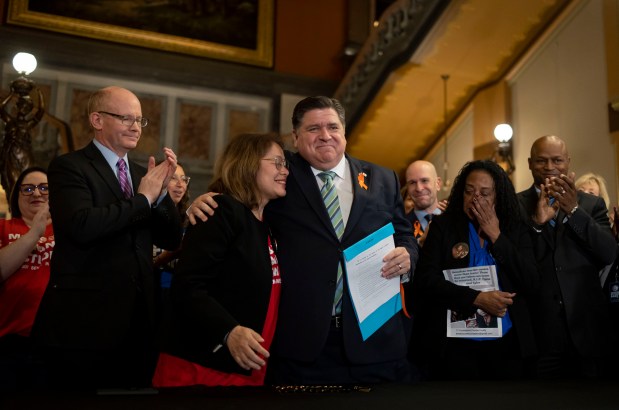
When Pritzker first took office, then-Illinois House GOP leader Jim Durkin was eager to show Pritzker and the public that the minority GOP could work with the Democratic governor.
Some Republican lawmakers supported cannabis legalization, the capital construction program and even a budget package that included tax and fee increases to pay for the public works projects.
“Gov. Pritzker was able to, I think, negotiate in good faith with me on the budget, but also the capital bill, and I found that as a really good exercise and a good result,” Durkin said.
While Pritzker and Durkin had a number of high-profile “differences of agreement,” including over issues involving taxes and the justice system, “he always listened,” Durkin said.
“He can tell me, ‘You’re dead wrong. I’m doing something different.’ But the thing is, he listened to me.”
Even as state spending has grown by nearly one-third during Pritzker’s five years in office, independent observers have given his administration high marks for balancing the budget each year without relying on the kind of gimmicks that got Illinois into past fiscal quagmires. Pritzker has routinely touted the state’s first credit upgrades in decades.
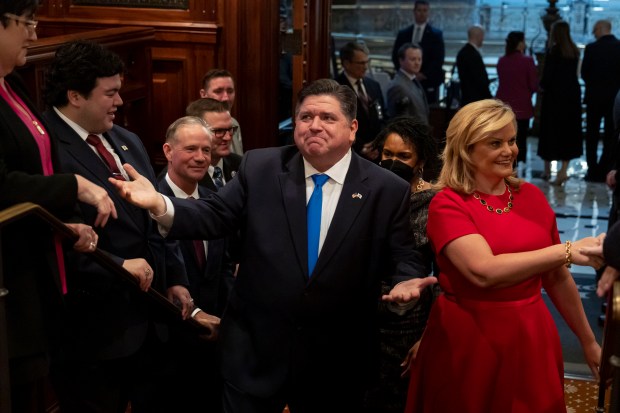
Given all he’s accomplished in a relatively short time, it wasn’t surprising to see Pritzker’s name on Harris’ short list of potential running mates, said Illinois Senate President Don Harmon, who’s known Pritzker since the ’90s.
“If a Vice President Pritzker could have done half as much good for the country as Gov. Pritzker has done for the state of Illinois, the nation would be well served,” Harmon said. “That said, selfishly, I’m very grateful that he’s going to be sticking around Illinois as our governor.”
Ever a Trump detractor
Throughout his time in office, Pritzker hasn’t let up on criticizing Trump, blasting the administration’s handling of the coronavirus pandemic from the lectern at daily media briefings and calling him out personally on a presidential conference call with governors during the unrest following George Floyd’s murder.
The attacks on Trump have only intensified during the 2024 campaign, with Pritzker making frequent references to the former president’s criminal conviction and other legal troubles.
Pritzker has repeatedly described the Republican nominee as a “racist,” “misogynist,” “homophobe,” “congenital liar,” “adjudicated rapist” and “convicted felon,” much to the delight of his party’s base.
Trump also seems to have taken notice.
“Illinois’s badly run with Pritzker,” Trump told Elon Musk last week during a streamed conversation. “He’s a real loser.”
With his own political path somewhat obscured, Pritzker is working to keep his party focused on beating Trump — “a uniquely awful man with evil intentions” — in November.
“I don’t know whether I’ll run for reelection,” Pritzker said of a potential bid for a third term in 2026. “But what I do know is that if I’m successful over the next two and a half years … we will have had eight really, really good years for the state of Illinois — with all the challenges, COVID and everything else that we’ve had to overcome — but we will have moved the state in a very positive direction. And I think that’s a legacy that anybody can be proud of.”
Once again, Pritzker’s future may be determined by whether Trump wins the presidency.
Chicago Tribune’s A.D. Quig contributed.


